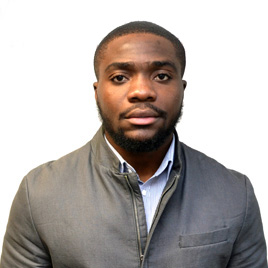
Hometown: Lagos, Nigeria/North Carolina
Undergraduate: North Carolina Central University, BS in Biology and Pharmaceutical Science
Student's next step: Entered Temple University School of Podiatric Medicine, Fall 2019
Can you tell me a little about yourself before you came to Drexel?
I was born and raised in Lagos, Nigeria. I moved to the United States in April of 2009 and finished high school here. I went to North Carolina Central University where I played Division I football. I also majored in biology and pharmaceutical science with a minor in chemistry. While I was there, I did research on Alzheimer's and Huntington's disease. I studied kynurenine monooxygenase pathway in correlation to Alzheimer's disease, trying to find a way to limit the neurotoxins that actually cause the disease. Additionally, I was really involved on campus, especially with Students for a Better Africa. We would collect donations for Africa and help spread awareness of the needs of African countries. I was also in Biology Club and Chemistry Club.
When you finished your undergraduate degree, did you come straight to Drexel?
Yes, I graduated in May of 2017 and started Drexel in August 2017.
Why did you decide to apply to a post-baccalaureate program?
I always knew I wanted to go to medical school, but my credentials were not strong. I decided to look up a few post-bac programs and ran across Drexel University College of Medicine. The fact that you can get a master's degree while preparing for medical school was a plus for me. Additionally, the Interdisciplinary Health Sciences (IHS) program offers free MCAT prep courses and courses that prepare you for the rigors of first and second-year med school courses.
What has your experience been like in the program?
It's been wonderful. It's a very friendly environment. The professors push you to be the best you can be, especially academically. They don't limit everything to the classroom. They're interested in your personal life and how you're coping with the stress of school. The faculty and students have been wonderful. People are not competitive with each other here. Everyone is working toward a common goal, so everybody looks out for one another.
How was moving to Philadelphia?
Home in North Carolina is almost seven hours away, so it was a bit of a change for me. However, I was born and raised in Lagos, which is a big city, so I'm used to the fast pace of city life.
Are you currently doing research?
Yes, I am doing research at Penn Memory Center with the University of Pennsylvania Health System. I'm actually analyzing physical activity in correlation to preventive and treatment measures for Alzheimer's patients, mild-cognitive-impairment patients and healthy geriatric patients, as well, because they're most susceptible to these newer degenerative diseases. We measure the amount of physical activity and how it can help prevent those diseases.
When did you know that you wanted to go into medicine?
I was seven years old, and I lost my grandfather to a myocardial infarction. This happened in Nigeria, and it wasn't even a major heart attack. The doctors just didn't have the resources to get my grandfather stable. I vowed to myself then that I wanted to work in medicine to help create a better life for people who are suffering.
Are you involved with any extracurricular activities or volunteer work?
Yes. Both last semester and this semester, I'm doing work with Student-Run Emergency Housing in Philadelphia. We house mostly males during the coldest months of the year. We provide shelter and food, clean their living space, and fraternize with them because there's a stigma around homeless people. People try to stay away from them, and a lot of them experience mental illnesses and depression because they're alone, so just being a friend to them helps. I also do the mentorship program, helping incoming first year students get acclimated to the environment and advising them on classes to take, how to study for the MCAT, and pretty much how to be a good student.
What advice do you have for people who are considering coming here?
First off, do your research on the program and make sure it's the best fit for you. Once you're here, focus and put a lot of time into studying. You should also pick your classes wisely. The IHS curriculum is pretty flexible compared to most other programs. You should craft the program to fit what will most help you in the near future, whether that's preparing for the MCAT or for when you get into medical school.